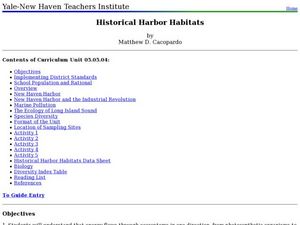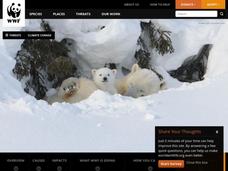Teacher Web
Archaebacteria and Eubacteria
Take young biologists back to the beginning of life on Earth with this presentation on bacteria. Examining the different classifications of bacteria, this presentation introduces young scientists to the concepts of autotrophs and...
Cornell University
Bacteria Take Over and Down
Bacteria outnumber all other forms of life on Earth. Scholars observe the growth of bacteria in petri dishes to understand their role in maintaining good health. Then, they observe the growth of bacteria after they introduce...
Curated OER
Classify the Microbes
Students classify microorganisms into categories based on their characteristics. Pupils use a taxonomic key to identify organisms. They classify certain bacteria, protists, and viruses using a classification or taxonmic key.
Curated OER
Microbes and Health
Students participate in activities that show them how tiny germs are spread. In this germs lesson plan, students engage in hands on lessons to show them how microorganisms can easily spread disease through the mouth and hands.
Curated OER
Don’t Cry Over Spoiled Milk!
Seventh graders explore how milk spoils over time. In this biology lesson plan, 7th graders discover how pH changes as microorganisms enter the food and multiply. They explain the benefits of pasteurization process.
Curated OER
Milk Glue
Students create glue from milk by curdling milk with an acid. In this protein denaturing lesson plan, students experiment with milk and vinegar to denature the proteins in milk, create curds and whey and use the curds to produce glue by...
Curated OER
Mini-Ponds
In this mini pond worksheet, students create a mini-pond ecosystem with soil, water, and plant life. Students let their ecosystem sit for a day and they observe a sample the next day. Students identify all the pond water microorganisms...
Curated OER
Historical Harbor Habitats
Tenth graders create food web displays in the classroom. For this ecology lesson, 10th graders identify the different pollutants in the environment and their effect on organisms. They collect samples of sediments from the harbor and...
Curated OER
Pond 2: Life in a Drop of Pond Water
Students observe organisms found in pond water with a microscope. In groups, they discuss how single-celled organisms satisfy their needs for food, water and air. They compare and contrast the needs of macroscopic and microscopic...
Curated OER
Ecological Relationships
Middle schoolers identify ecological elements and their factors on species, populations and food webs. They analyze ecosystems for these elements and research how these factors influence species survival rate. Predictions on conditions...
Curated OER
Foiling Spoilage
In this agricultural education activity, students read 6 descriptions of bacteria that cause food spoilage. Students then read 4 descriptions of preservatives that can be used to prevent spoilage. The activity is meant as a display.
Curated OER
Ice Mummies: Frozen in Heaven
Students conduct an experiment to investigate the rate of microbial growth at different temperatures. Students predict what will happen to the food at various temperature and test their hypotheses. Students describe the differences in...
Curated OER
Brine Shrimp Feeding
Third graders study the diet of the brine shrimp. This is an introduction to a math measurement of a micrometer because of the size of the food brine shrimp feed upon. They make predictions about the types of food shrimp eat based on...
Curated OER
Milk: A Practical Application
Students examine the impact of the physical and chemical properties of milk and its use as an important food.
Curated OER
Germinating Seeds on Gelatin
Young scholars germinate seeds in unflavored gelatin to which liquid house plant food has been added. Students observe and record plant growth in this medium with a variety of variables in a number of experiments.
Curated OER
Apple Science
Sixth graders explore agriculture by viewing a fruits and vegetables video clip. In this apple characteristics lesson, 6th graders discuss how fruits and vegetables deteriorate after being exposed to oxygen and identify methods to defend...
Curated OER
Microbe Power - Using a Winogradsky Column as a Battery
In this lesson the student demonstrate analysis of the changes taking place in the bottle as well as bdemonstrate application of the interactions happening in the bottle by applying these changes to the environment.y measuring and...
Curated OER
Organic and Inorganic Waste
Learners conduct a scientific investigation about organic or inorganic waste. In this organic or inorganic waste activity, students create a compost heap to determine the difference between inorganic and organic waste. Learners record...
Captain Planet Foundation
Rotting Away
What happens at the end of a plant's life cycle? Show kids the natural way that plants show that they're decomposing, as well as the importance of compost, with a lesson about living organisms. After reading Log Cabin by Anne Schreiber,...
Curated OER
Invisible Life
By setting up an aquarium in the classroom, learners are able to describe some macroscopic and microscopic organisms that are found inside. This well-designed, and educationally rich instructional activity requires pupils to use...
University of Kentucky
Beneficial Bug Scavenger Hunt
Many people think of bugs as annoying pests to be squashed, but most insects and spiders are beneficial, eating the actual pests or pollinating plants. After reviewing some of the common bugs in your area (they may differ from those...
American Museum of Natural History
Gusty: The Gut Microbiome Card Game
Build up your gut. Groups up to four play a card game to learn more about the microbiome in the gut. Learners try to build a healthy gut with their cards. The player acquiring six microbes without any pathogens wins the game.
Curated OER
Climate Change And Disease
Students consider the role of climate change in the occurrence of vector born diseases such as malaria. In small groups, they research a specific vector to complete an information chart on climate changes in the region where the vector...
Teach Engineering
Clean it Up!
Harness the power of bacteria. Scholars see how using organisms that exist in nature can help solve human problems in the process known as bioremediation. They research and discuss several successful examples, such as using oil-eating...

























